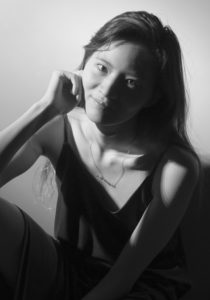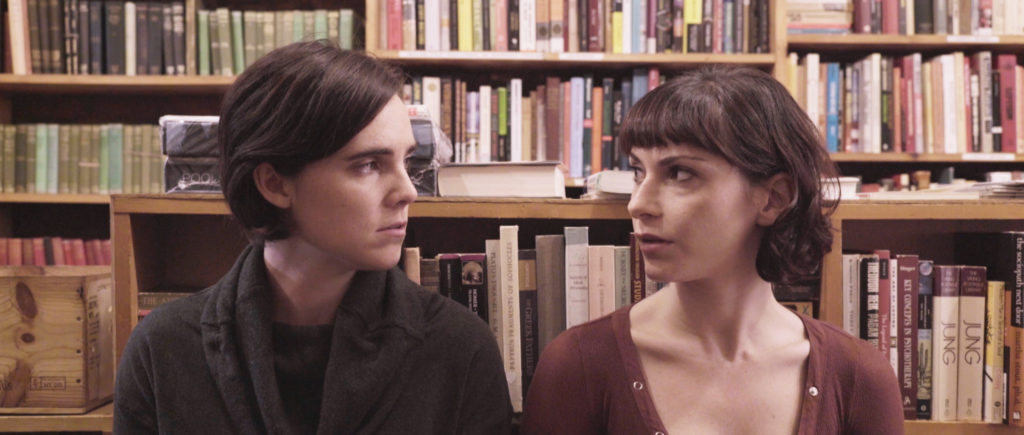Showcase Filmmaker Spotlight: Jing Ma
Showcase Filmmaker Spotlight: Jing Ma
By Travis Trew, Programming Associate
 Originally from Shanghai and currently finishing her senior year studying photography at Temple University, Jing Ma has also been been making films for the last three years. Cure follows a young woman named Kate (Mandy Evans) as she attempts to struggles to cope with the suicide of her brother, Edward (Justin Pietropaulo).
Originally from Shanghai and currently finishing her senior year studying photography at Temple University, Jing Ma has also been been making films for the last three years. Cure follows a young woman named Kate (Mandy Evans) as she attempts to struggles to cope with the suicide of her brother, Edward (Justin Pietropaulo).
PFS: When did you start getting into making films?
JM: I took one photography class that analyzes photography in film and we did a project where we made short videos and learned how to edit. I really liked it, so that got me into filmmaking. I always loved writing, reading, and making art, so it was really hard for me to decide what I liked the most and what I wanted to pursue as a career in the future. Since that class, I realized that filmmaking is kind of the ultimate medium because it allows me to combine all my interests together. I’m still majoring in photography, so I basically learned filmmaking outside of school by myself, just by watching a ton of films, reading a lot of scripts, and learning how to write scripts by myself.
PFS: Tell me a little about Cure. Where did the initial idea for the film came from?
JM: I’m kind of nerdy, so I read a lot of scholarly papers on psychology and psychiatry cases. I’m really interested in humans and how different people react to tragic events, and how people cope with losing someone close them. I personally experienced the deaths of both of my grandparents, who were really close to me. So that really got me thinking about ideas for Cure.
PFS: Was it tough translating some of those themes into a narrative drama?
JM: Originally, the screenplay was—I wouldn’t call it sci-fi, but it had a little bit of that element in there, with Edward talking to someone in a parallel universe, or another self. But that didn’t quite work out. I cut out a lot of the dialogue that I just didn’t think worked well. Originally, the film was about 18 minutes, but I cut out almost half of the original footage.
PFS: It must have been really tough to part with so much footage that you’d already shot.
JM: It was really tough. I shot it in the fall of 2016, and I had several different cuts after I started the post-production, then finally got the final cut in the last year. So it took me almost a year to keep coming back and look at the footage and decide what I really want and don’t want. And honestly, I’m still not completely satisfied with the final result, but I think that’s the best I can come up with the existing footage. As time goes on, your perspective changes. I learned more and started to see the flaws in the original screenplay and the storyline. I do think it’s important to let it sit for a while and then come back to it. You’ll have a different view on the work.
 PFS: The main character, Kate, goes through a really complicated transition from not wanting to believe that her brother killed himself to finally coming to terms with his suicide. How did you approach that character?
PFS: The main character, Kate, goes through a really complicated transition from not wanting to believe that her brother killed himself to finally coming to terms with his suicide. How did you approach that character?
JM: I wanted a character who develops over the course of the film. Suicide is very different from any other cause of death, and it’s usually a shock to people. So you need a period of time to adjust to the fact and learn to live with it, and accept this person’s personal choice. When I was younger, I always thought people who had mental health issues or committed suicide were irresponsible toward the people that loved them since, ultimately, it’s the friends and family around them that would suffer. But then as I grew up, I realized that sometimes depression and mental health aren’t something that you can take control of. We should maybe respect people who make that choice. It’s not like they don’t love you enough, or that they’re not responsible enough; it’s just a personal choice. It’s like when you have a physical illness, like cancer. You don’t have any way to cure your disease, and maybe you choose to just die peacefully. It’s the same with mental health.
PFS: The final shot of Kate lying in bed with Edward beside her is really powerful. What does that represent to you?
JM: It’s not really him being there, but it’s showing how people come to terms with loss. Ultimately no one else can convince you of something except yourself. So it’s kind of Kate telling herself that she should let her brother go but should still love him and honor him. It’s kind of like paying respects, I think, because previously she was blaming him and was trying to find another, outer cause for his death.
PFS: Is there a particular aspect of the process that you’re more drawn to?
JM: I major in photography so I’m really into the visual aesthetics. I’m really drawn to setting up lighting and framing, and getting a beautiful picture that conveys the theme of the story. Of course the whole research part of writing screenplays is really attractive to me because I learn so much from reading and I do think the screenplay is the most important part of the film. It’s all about story, so I spend a lot of time on that. For example, for my current screenplay I have to read a ton of books, studying a lot to get all the characters right so that the story makes sense. But I really enjoy that part.
PFS: Can you tell me a little about the screenplay you’re working on now?
JM: Recently I’ve been very into the environment and the history of China. So it’ll be about Freedom Fighters, and reflecting on what people are actually fighting for when they say they fight for freedom. Because I feel like it’s very vague. For example, the 1989 protests that happened in China were a student movement. My mom was actually a participant during that protest. I asked her, “What do you think you were doing that for?” She said, “I think it’s what young people do.” They wanted freedom of speech and press, and they wanted democracy. But they were very young, they were in their early 20s. So I was interested in exploring: what do you do with freedom? I wanted the setting to be 2035, after another world war, and to explore how the whole political spectrum would be in the future if we were heading towards something like A Brave New World. I feel like we have this amnesia. We don’t learn anything from our traumatic history. I think it’s really important to look back and examine. I want to get a story that looks like it happens in the future, but you can see it now and be like, okay, we don’t want that to happen in the future. So we should do something to avoid it.
PFS: That sounds really interesting. Do you have any plans to produce it yet or are you just focusing on the screenplay?
JM: I’m currently revising the script, and I have a friend who is also a screenwriter. So I’m kind of getting advice from him. I know some other filmmakers that I want to collaborate with. And I’ll maybe try to crowd fund in some way to get the budget to shoot it over the summer. That’s my plan right now, but it’s very early development.
Cure will screen on Thursday, April 12 at the Prince Theater’s Black Box as part of Philly Film Showcase, an exhibition supporting new work by talented, up-and-coming local filmmakers.